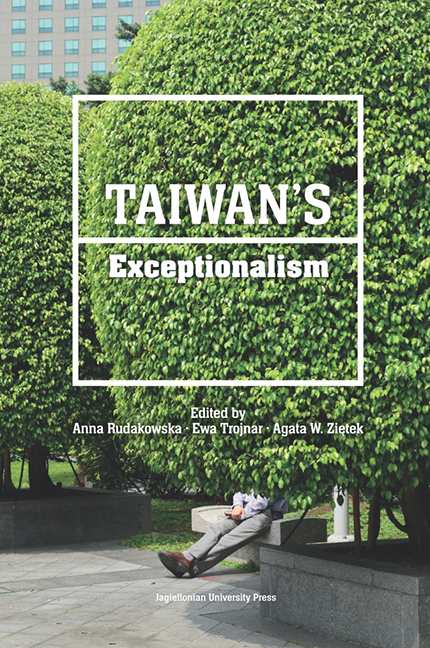Book contents
- Frontmatter
- Contents
- 1 Unpacking Taiwan's Exceptionalism: Themes and Studies
- 2 The Legal Status of Taiwan under International Law
- 3 Taiwan’s Unique Position Toward the South China Sea
- 4 Taiwan-China-United States Relations: Taiwan’s Unique Safe House for Better or Worse
- 5 Exceptionalism under a Glass Ceiling? Taiwan’s Democratic Development and Challenges
- 6 The Sunflower Movement: An Example of the Dynamics of Civic Activity in Taiwan
- 7 The Development of Indigenous Tourism Clusters in Taiwan: Economic and Cultural Foundations of Sustainability
- 8 A Shark Paradise in Taiwan (Dis)appears: From Shark Soup to Shark Diving
- 9 Taipei’s Soft Power at Work: The Image of Taiwan in Polish Dailies “Gazeta Wyborcza” and “Rzeczpospolita”
- Contributors
- List of Figures
- Index
1 - Unpacking Taiwan's Exceptionalism: Themes and Studies
Published online by Cambridge University Press: 16 July 2022
- Frontmatter
- Contents
- 1 Unpacking Taiwan's Exceptionalism: Themes and Studies
- 2 The Legal Status of Taiwan under International Law
- 3 Taiwan’s Unique Position Toward the South China Sea
- 4 Taiwan-China-United States Relations: Taiwan’s Unique Safe House for Better or Worse
- 5 Exceptionalism under a Glass Ceiling? Taiwan’s Democratic Development and Challenges
- 6 The Sunflower Movement: An Example of the Dynamics of Civic Activity in Taiwan
- 7 The Development of Indigenous Tourism Clusters in Taiwan: Economic and Cultural Foundations of Sustainability
- 8 A Shark Paradise in Taiwan (Dis)appears: From Shark Soup to Shark Diving
- 9 Taipei’s Soft Power at Work: The Image of Taiwan in Polish Dailies “Gazeta Wyborcza” and “Rzeczpospolita”
- Contributors
- List of Figures
- Index
Summary
Abstract: This chapter introduces readers to the book. It first elucidates a belief shared by all of its authors concerning Taiwan's exceptionalism in two areas – external and internal affairs. Second, it looks at the literature on the unique situation of Taiwan in the landscape of international affairs and its consequences for the island, with particular attention to the state of research on this topic in Poland. Finally, it presents the structure and content of this volume.
Keywords: Taiwan, China, international recognition, international status, sovereignty, South China Sea, UNCLOS, United States, cross-Strait relations, soft power, diplomacy, democratization, Sunflower Movement, civil society, indigenous tourism, sustainable tourism, ecotourism, environmental awareness
Introduction
Take a look at the political map of the world and you will see that almost every piece of land belongs to a state. This division – in contrast, for example to the split created by a valley between two mountains – is man-made, imaginary and arbitrary, and therefore can be easily questioned. Indeed, in addition to the multiple disputed borders that permeate the world map, some countries are not recognized or partially recognized. Other states decide whether a certain political unit can be recognized as sovereign. Again, even though their decision concerns imaginary divisions created by borders, accepting or rejecting them has far-reaching consequences in real life. The unrecognized country remains excluded from a club of sovereign states, which makes cooperation with its members very difficult or even impossible. It has no choice but to invent novel ways to conduct external relations. Moreover, this specific international situation has a major impact on its politics, people's lifestyles, culture, etc.
This book is about such an exceptional entity in the international community of states – Taiwan. Taiwan is a small island that covers an area of 35,883 km2 and lies nearly 180 km off the southeastern coast of mainland China across the Taiwan Strait. Its surface is approximately 395 km long from north to south and 145 km across at its widest point. Its landscapes are captivating. No wonder the Portuguese sailor navigating towards Japan in 1542 called this land Ilha Formosa – “beautiful island.”
- Type
- Chapter
- Information
- Taiwan's Exceptionalism , pp. 7 - 18Publisher: Jagiellonian University PressPrint publication year: 2022



